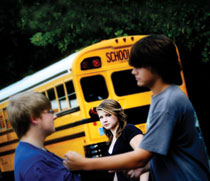The Hidden Effects of Violence
By Doug Gillett
 |
In March, the Department of Justice announced the results of an encouraging study on youth violence: Less than 15 percent of American children reported being physically bullied at school in 2008, compared to 22 percent five years earlier. The percentage of children who reported that they had been assaulted by other kids in any setting—their siblings included—also dropped, from 45 percent to 38.4 percent. But according to a recent UAB study, more than four-fifths of Birmingham-area middle schoolers had witnessed or been victimized by a threat or actual violence in the previous year—and a child didn’t have to be hit by a punch to feel its effects. Observing violence at home or in school can significantly raise a child’s anxiety level and symptoms of depression, the study found.
Psychologist Sylvie Mrug, Ph.D., examined reports from more than 603 children at Birmingham-area middle schools. Twenty-seven percent of the children said they had been personally victimized by bullying, and 82 percent said they had witnessed or been victimized with a threat or actual violence at school, home, or in their neighborhood. Researchers found that experiencing violence in school or the home has a more severe effect on kids than violence in their communities.
“Witnessing violence and victimization at home and school was uniquely associated with depression, anxiety, and aggressive behavior over time,” Mrug explains. It can be difficult for teachers and guardians to address these issues before they begin to manifest themselves outwardly, she says. “In many cases, teachers and parents are not aware of teenagers’ experiences with violence. They may also not recognize emotional problems such as depression and anxiety. They are more aware of kids who are acting out, demonstrating aggressive behavior.”
Mrug says the study’s findings highlight the need for teachers and parents to prevent children’s exposure to violence. “There are many studies that have looked at both the witnessing of violence and victimization at home, school, and the community—all different types of exposure are linked with adjustment problems,” she says.
__
Dr. Mrug explains more details of her study in this video:
More Information